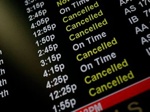Back in the 2008 election, many Americans became convinced that our economy had become a victim of extreme greed and selfish motives. Going back a decade and pointing to the excesses of a few companies such as Enron, Worldcom and then leading up to Lehman Brothers and AIG, we were told that these debacles could be "tamed" simply by introducing regulation and oversight.
There is an old saying, "be careful what you wish for, you just might get it". And get it we are!
Regulation is running rampant in our government these days. In many circumstances we are beginning to see that even regulation begun in earnest by honorable people can have unintended consequences.
Genies often fulfill wishes in unexpected ways and while the person is granted their wish, they often come to regret it.
Consider Airline Regulations
According to a story in USAToday; "For travel consumers, the government's increased regulatory focus on the airline business can cut two ways. New regulations or laws often effectively address specific complaints but can have unintended consequences, too.
The tarmac delay rule is an example.
Since it was implemented, the chances that anyone will be kept onboard a plane for more than three hours during a ground delay — always statistically extremely low — is now almost nil. The threat of a $27,500-per-passenger fine against any airline that allows it to happen all but ensures that it won't happen.
In July, there were just three instances of domestic flights stuck on the ground for more than three hours with passengers aboard, according to airline data reported to the DOT. But there was a 20% increase in the flight cancellation rate as airlines chose to abort flights rather than risk big fines for excessive ground delays. (The actual number of flight cancellations in July was smaller than in July 2009. But there was unusually good flying weather this July in New York, the biggest source of delays in the nation.)
So the question is, which is better for most travelers: being delayed, uncomfortably so, for more than three hours but eventually reaching the destination, or having the flight canceled and scrambling to find an available seat on another flight at a time when planes are 80% full on average?"
Meanwhile, opponents still warn that the three-hour tarmac rule will lead to a lot more travelers having their flights canceled than ever were inconvenienced by lengthy ground delays.
Whether the rule change actually leads to that probably won't be known until next winter or spring, when bad weather could play havoc with airline schedules
Time to put the Genie back in the bottle?
For many, the message of the tea-party is simply one about cutting spending and taxes. What I read and hear from those who are passionate proponents of this philosophy is more robust than simply about cutting taxes. It is about Freedom and a faith that the fewer decisions are made by government appointed bureaucrats and the more individuals are empowered to make choices, better solutions ultimately reveal themselves.
This airline tarmac rule is but one example of what happens when we turn to big government to address issues. It is time to put this drive to regulate everything on-hold and re-consider the bureaucratic mess we have already put in place.
Let Freedom Ring!


No comments:
Post a Comment